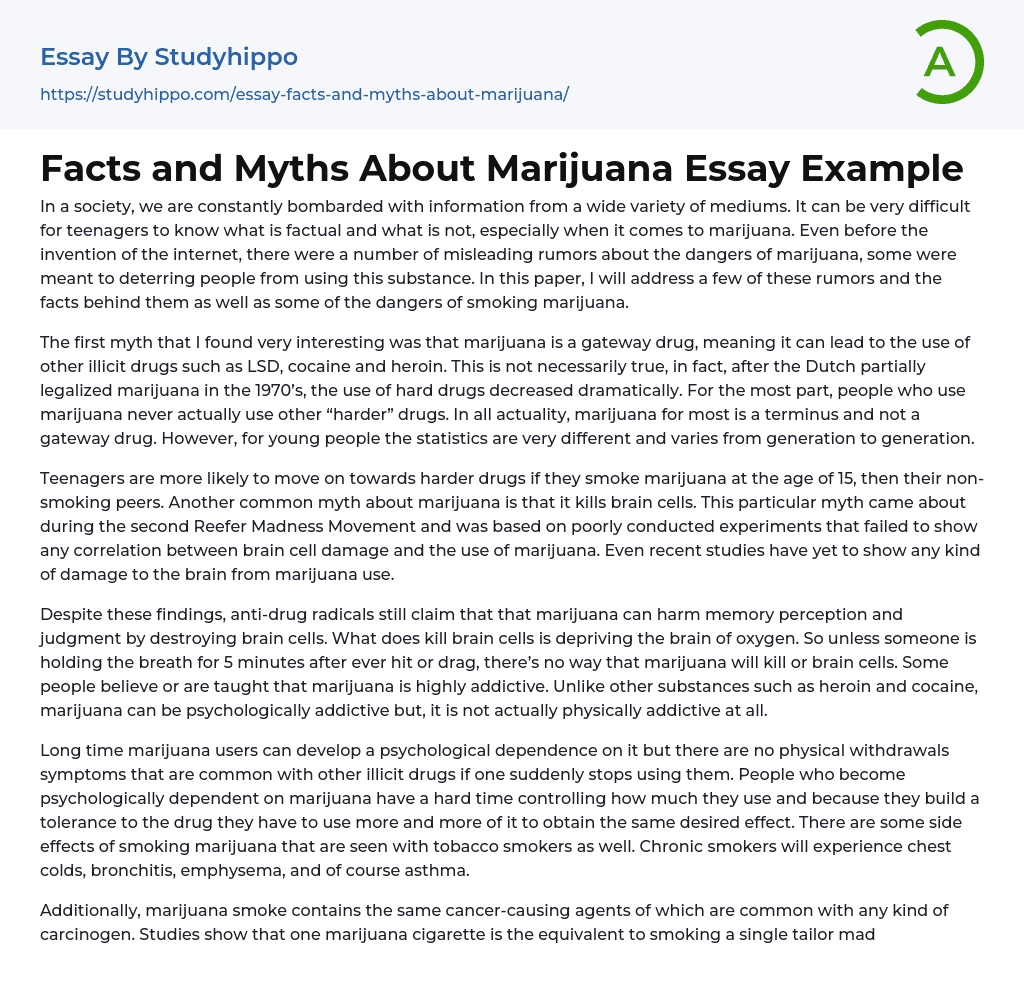We are continuously exposed to a diverse range of media, bombarding us with information in our society. This can particularly make it hard for teenagers to distinguish between facts and fiction, especially about marijuana. Misleading rumors about the threats posed by marijuana, often aimed at preventing its use, have been circulating even before the advent of the internet. This paper will tackle some of these rumors with fact-checking and also highlight some risks associated with marijuana smoking.
The idea is often put forward that marijuana acts as a gateway to the consumption of more potent illegal drugs such as LSD, cocaine, and heroin. However, this theory may not always be accurate. Take for example when partial decriminalization of cannabis occurred in the Netherlands during the 1970s leading to a significant decrease in the use of stronger substances. It's generally observed that those who consume can
...nabis are not necessarily tempted to try other more intense drugs. More frequently than otherwise, marijuana is considered an end goal rather than a launching pad to drug use. Still, these patterns can significantly differ among different generations and age groups.
Individuals who consume marijuana during their teenage years, particularly at 15, have a higher propensity to advance to harsher substances compared with their non-consuming counterparts. A prevalent misconception asserts that marijuana results in the death of brain cells. This misunderstanding originated during the second Reefer Madness Movement, powered by inadequate and poorly executed experiments which found no links between brain cell harm and marijuana consumption. Contemporary research also fails to suggest any form of brain damage resulting from the use of marijuana.
Even with recent studies, there's a significant number of people who
staunchly oppose drugs and continue to believe that marijuana can impair memory, perception, and judgment by destroying brain cells. However, the reality is that it's lack of oxygen that actually leads to the death of brain cells. Consequently, unless an individual stops breathing for five minutes after each inhalation, marijuana cannot eliminate brain cells. There remains a group who either maintain their belief or have been taught to presume that marijuana is highly addictive. Yet compared to substances such as heroin and cocaine - whereas marijuana may potentially cause psychological dependence - it does not result in physical addiction.
Despite the absence of physical withdrawal signs compared to other illegal substances, prolonged marijuana use can lead to psychological addiction. People who develop such dependence find it challenging to control their intake, and they require increasing quantities over time due to increased tolerance for achieving the same impact. Frequent users also encounter health problems typically seen in tobacco smokers such as chronic chest infections, bronchitis, emphysema and asthma.
Moreover, the smoke generated by marijuana consists of cancer-causing elements similar to those in other carcinogenic substances. Research has established that smoking one joint is equivalent to smoking a single manufactured tobacco cigarette (excluding hand-rolled ones). The danger posed by frequent marijuana use is particularly significant for young people in their formative years. Regular consumption of marijuana can damage their learning and decision-making capacities, potentially obstructing the development of essential social coping abilities.
Cannabis can hinder driving skills, posing a heightened risk for novice teenage drivers, especially when combined with alcohol. This is one of the numerous facts, misunderstandings and cautions regarding cannabis use in youths. I argue that under suitable
conditions, cannabis can act as a harmless social catalyst, similar to alcohol. Yet it also has both beneficial and detrimental impacts akin to those of alcohol. Therefore, if you opt to use cannabis, do it wisely. Settle down on a cozy couch with a packet of Doritos and invite some pals over for an enjoyable movie night.
- alcoholism essays
- Smoking essays
- Casino essays
- Tobacco essays
- Heroin essays
- Social Media Addiction essays
- Cell Phone Addiction essays
- Tobacco Smoking essays
- Effects Of Smoking essays
- Cocaine essays
- Why Marijuana Should Be Legalized essays
- Drug Abuse essays
- Teenage Drug Abuse essays
- Addiction essays
- Anatomy and Physiology essays
- Biodegradation essays
- Cancer essays
- Dental Care essays
- Disability essays
- Disease essays
- Disorders essays
- Health Care essays
- Infectious Disease essays
- Inquiry essays
- Intelligence Quotient essays
- Lung Cancer essays
- Medicine essays
- Neurology essays
- Nutrition essays
- Olfaction essays
- Physical Exercise essays
- Public Health essays
- Sex essays
- Women's Health essays
- World health organization essays
- alternative medicine essays
- Aspirin essays
- Cannabis essays
- Cardiology essays
- Cloning essays
- Dentist essays
- drugs essays
- Hemoglobin essays
- Medical essays
- Medical Ethics essays
- Organ Donation essays
- Patient essays
- Pharmacology essays
- Plastic Surgery essays
- Surgery essays




